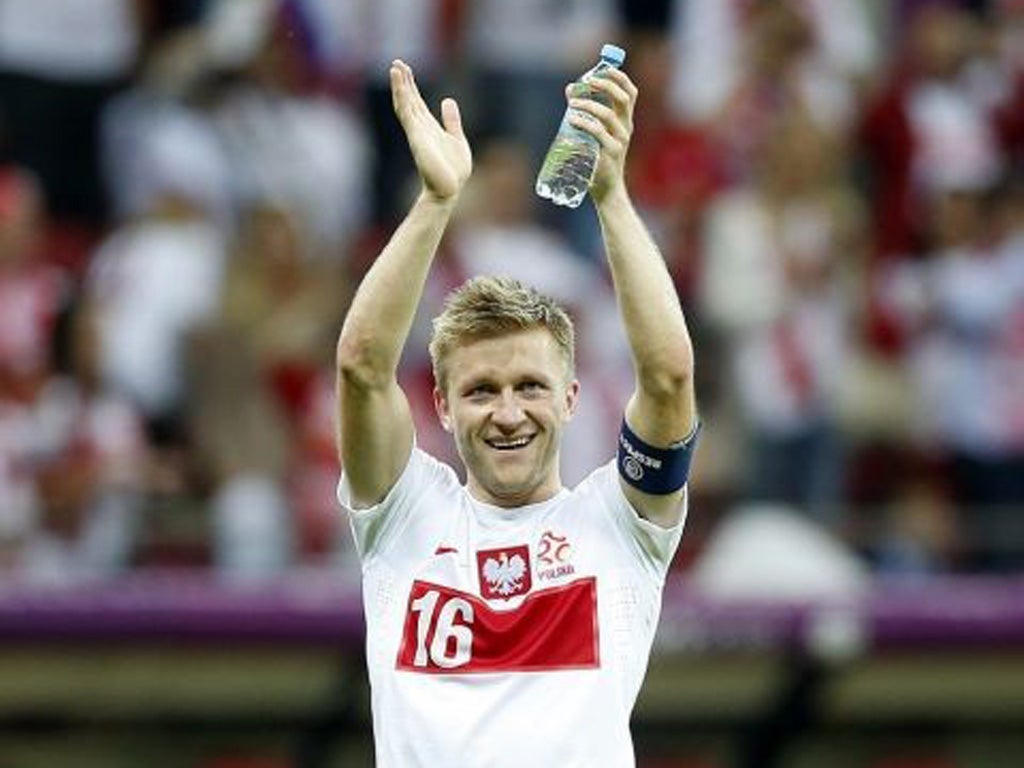Poland prepare to do battle with less noisy neighbours

With a place in the quarter-finals at stake, Poland are ready to make history against the Czech Republic today. The Euro 2012 co-hosts will be seeking their first victory of the tournament – and first quarter-final berth at the European Championship – at the Municipal Stadium in Wroclaw, following 1-1 draws with Greece and Russia in Group A.
"It's going to be a mini-final for us," said the Poland captain, Jakub Blaszczykowski. "It'll be the biggest match in the recent past for all of us."
The Czechs are a point ahead of Poland after beating Greece 2-1, following a 4-1 loss to Russia. A win for either team will put them through. The Czechs, however, could be missing their captain, Arsenal's Tomas Rosicky, because of an Achilles tendon injury.
The hooliganism that took place around Poland's emotionally charged match against Russia on Tuesday is not expected to be repeated today. Unlike the relations between Poland and Russia that are tense due to a bitter and bloody history, the Poles have an easier relationship with their southern Slavonic neighbours and have treated them accordingly.
The mayor of Wroclaw, where the Czechs are based and where they play all three group matches, hosted a lunch for the team at City Hall and thousands of Polish fans attended open training sessions, cheering the Czech players and applauding every goal in practice matches. To the Czech team's pleasant surprise, the local public showed strong support even in the rain and even after the demoralising loss to Russia.
That was in stark contrast to Czech fans, who booed the coach Michal Bilek and striker Milan Baros, blaming them for the poor performance.
"So far, we've been feeling here like at home," said the Czech Republic goalkeeper Petr Cech, who has recovered from a shoulder injury and will face Poland.
To prove the friendly atmosphere before the match, Cech gave some advice to the Poles on how to solve the dilemma of whether to start with the substitute goalkeeper Przemyslaw Tyton, who saved a penalty against Greece, or Wojciech Szczesny, who was sent off in that match and banned for the game against Russia.
"If I were a coach, I would put Lewandowski in the goal," Cech said, with a smile.
Robert Lewandowski has been impressive as Poland's sole striker, scoring with a powerful header against Greece last week in Warsaw. But after two matches at the National Stadium, Poland must travel to Wroclaw, not far from the Czech border.
"We've grown used to this [Warsaw] stadium and this field, and it would be nice to play here," the midfielder Rafal Murawski said. "But we're playing at home, regardless of where it is, and we're going to play to win and I think the fans there will help us win."
Authorities expect about 50,000 Czechs to flood the city and are now expanding the capacity of the fan zone from 30,000 to 45,000.
Poland's public broadcaster, meanwhile, has apologised for showing the Soviet flag on a news broadcast giving the result of the match with Russia this week.
The graphic, showing a small red flag carrying the hammer and sickle – which has not used as a national symbol for two decades – set in the foreground of the Polish white and red banner, appeared during Wednesday afternoon's edition of the news programme Wiadomosci.
Following the fall of the Soviet Union, the Russian white, blue and red flag replaced the communist symbols, which continue to spark mixed emotions in former Soviet satellites, including Poland. The difficult relationship, fraught with historical grievances, between Moscow and Warsaw was brought into the spotlight after hooligans attacked Russian supporters during their march to the stadium in Poland's capital on Tuesday. The march also celebrated Russia Day, the anniversary of declaration of the country's independence in 1990 as the Soviet Union collapsed.
Piotr Krasko, Wiadomosci's main anchor, said the controversial graphic was prepared for an earlier discussion of past matches between Poland and the Soviet Union.
Its use for Tuesday's game "was an unintended error at the worst possible moment," he told viewers.
Several Polish politicians criticised the mistake.
"We won't leave this matter alone," Jan Dziedziczak, a member of the parliament's culture committee, told the tabloid newspaper Fakt. "We demand a detailed explanation from the president of (public broadcaster) TVP."
Join our commenting forum
Join thought-provoking conversations, follow other Independent readers and see their replies
Comments
Bookmark popover
Removed from bookmarks